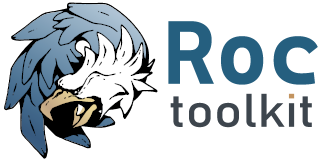Continuous integration¶
Overview¶
GitHub Actions are configured to build master and develop branches and pull requests.
GitHub Actions build Roc for Linux and macOS. Linux worker uses Docker to run builds on several Linux distros. Linux worker also uses QEMU to run cross-compiled tests.
Docker images for continuous integration and cross-compilation are built using GitHub actions and pushed to Docker Hub. They are based on official upstream images, adding pre-installed packages required for our build. Dockerfiles for images are hosted in a separate GitHub repository.
Docker images¶
The following Docker images are used on our CI builds.
Linux native¶
Image |
Base image |
Architecture |
Compilers |
|---|---|---|---|
rocstreaming/env-ubuntu:24.04 |
ubuntu:24.04 |
x86_64 |
gcc-14, gcc-13, clang-19, clang-16 |
rocstreaming/env-ubuntu:22.04 |
ubuntu:22.04 |
x86_64 |
gcc-11, clang-14 |
rocstreaming/env-ubuntu:20.04 |
ubuntu:20.04 |
x86_64 |
gcc-9, clang-10 |
rocstreaming/env-ubuntu:18.04 |
ubuntu:18.04 |
x86_64 |
gcc-7, clang-6 |
rocstreaming/env-ubuntu:16.04 |
ubuntu:16.04 |
x86_64 |
gcc-5, clang-3.8 |
rocstreaming/env-ubuntu:14.04 |
ubuntu:14.04 |
x86_64 |
gcc-4.8, clang-3.4 |
rocstreaming/env-ubuntu:nolibs |
ubuntu:latest |
x86_64 |
distro default |
rocstreaming/env-debian |
debian:stable |
x86_64 |
distro default |
rocstreaming/env-fedora |
fedora:latest |
x86_64 |
distro default |
rocstreaming/env-opensuse |
opensuse/leap:latest |
x86_64 |
distro default |
rocstreaming/env-archlinux |
archlinux/base:latest |
x86_64 |
distro default |
rocstreaming/env-alpine |
alpine:latest |
x86_64 |
distro default |
Linux toolchains¶
Image |
Architecture |
Libc |
Compilers |
|---|---|---|---|
rocstreaming/toolchain-aarch64-linux-gnu |
armv8-a |
glibc |
gcc-14.2, gcc-10.3, gcc-7.4 |
rocstreaming/toolchain-arm-linux-gnueabihf |
armv7-a |
glibc |
gcc-14.2, gcc-10.3, gcc-4.9 |
rocstreaming/toolchain-arm-bcm2708-linux-gnueabihf |
armv6 |
glibc |
gcc-4.9 |
rocstreaming/toolchain-mips-openwrt-linux-atheros |
mips32 24Kc |
musl |
gcc-13.3, gcc-5.4 |
Android toolchains¶
Image |
APIs |
ABIs |
Compilers |
|---|---|---|---|
rocstreaming/toolchain-linux-android:ndk26 |
21-34 |
armeabi-v7a, arm64-v8a, x86, x86_64 |
clang-17 |
rocstreaming/toolchain-linux-android:ndk21 |
21-29 |
armeabi-v7a, arm64-v8a, x86, x86_64 |
clang-9 |
Full Android environment¶
Image |
JDK |
|---|---|
rocstreaming/env-android:jdk15 |
openjdk:15.0.2-jdk-slim-buster |
rocstreaming/env-android:jdk11 |
openjdk:11.0.7-jdk-slim-buster |
rocstreaming/env-android:jdk8 |
openjdk:8u252-jdk-slim-buster |
How Docker images are built¶
Docker images are built using GitHub actions and then pushed to Docker Hub.
Each image directory contains one or several dockerfiles and images.csv file in the following format:
DOCKERFILE;ARGS (comma-separated list);TAG
This file defines what tags to build, path to dockerfile and build arguments for each tag. Build arguments are passed as ARGs to docker build.
If the value in the first column is left empty, it defaults to Dockerfile is in the same directory as images.csv. If the value in the last column is omitted, it defaults to the name of the directory which contains Dockerfile, e.g. if Dockerfile path is 14.04/Dockerfile, then tag defaults to 14.04.
Example:
DOCKERFILE;ARGS (comma-separated list);TAG
Dockerfile;MAJOR=4.9,MINOR=4,DATE=2017.01;gcc-4.9
Dockerfile;MAJOR=7.4,MINOR=1,DATE=2019.02;gcc-7.4
Dockerfile;MAJOR=7.4,MINOR=1,DATE=2019.02;latest
This file defines three tags: gcc-4.9, gcc-7.4, and latest. Each tag uses the same Dockerfile and different arguments MAJOR, MINOR, and DATE.
You can build an image(s) locally using:
./make.py [OPTIONS...] [IMAGE[:TAG]...]
For example, to build all tags of env-ubuntu image:
./make.py env-ubuntu
To build all tags of env-fedora image and two specific tags of env-ubuntu image:
./make.py env-fedora env-ubuntu:20.04 env-ubuntu:22.04
To build all images:
./make.py
For the full list of available options, run:
./make.py --help
Running CI steps locally¶
Run Linux native tests locally¶
CI steps for various Linux distros are fully dockerized and don’t depend on GitHub Actions environment. It’s easy to run them locally in exactly same environment as on CI.
You can find specific commands to run in build.yml file. Look for images that are named rocstreaming/env-*. For example, this command will run Fedora build:
$ scripts/ci_checks/docker.sh rocstreaming/env-fedora \
scripts/ci_checks/linux-x86_64/fedora.sh
Under the hood, this command will run scons in docker:
$ docker run -t --rm --cap-add SYS_PTRACE -u "${UID}" -v "${PWD}:${PWD}" -w "${PWD}" \
rocstreaming/env-fedora \
scons --build-3rdparty=openfec,cpputest --enable-debug test
Explanation:
-tallocates a pseudo-TTY to enable color output--rmremoves the container when the command exits--cap-add SYS_PTRACEenables ptracing which is needed for clang sanitizers-u "${UID}"changes the UID inside the container from root to the current user-v "${PWD}:${PWD}"mounts the current directory into the container at the same path-w "${PWD}"chdirs into that directory
Run Linux QEMU tests locally¶
There are CI steps that do cross-compilation and then run tests in QEMU (in user space mode, i.e. on host kernel).
These steps are also fully dockerized and you can run them locally. They use docker images that have both cross-compilation toolchain and QEMU pre-installed.
You can find specific commands to run in build.yml file. Look for images that are named rocstreaming/toolchain-*. For example, this command will run ARM64 build:
$ scripts/ci_checks/docker.sh rocstreaming/toolchain-aarch64-linux-gnu:gcc-7.4 \
scripts/ci_checks/linux-arm/aarch64-linux-gnu-gcc-7.4.sh
For more details, see Running cross-compiled tests in QEMU.
Run Android tests locally¶
CI steps for Android use emulator to run tests. You can do roughtly the same locally using android_emu.sh script:
$ scripts/android_emu.sh test
This command will pull rocstreaming/env-android Docker image, install necessary Android components inside it, build Roc, start Android emulator, and run Roc tests on emulator.
For more details, see Android Docker image.
